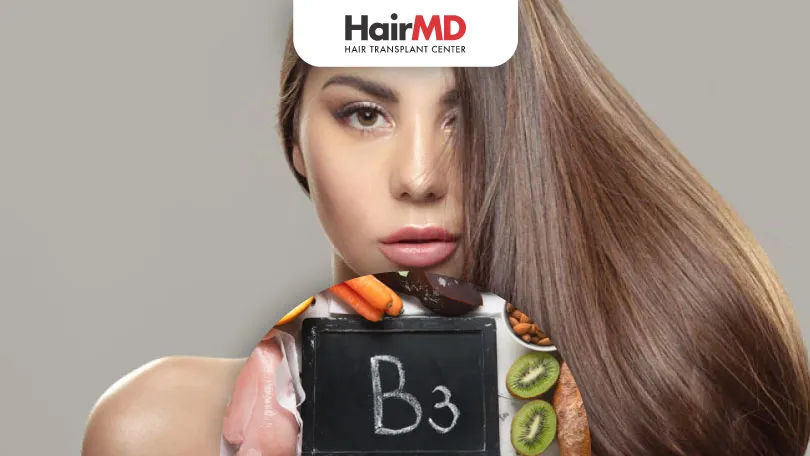
Everyone is appearance-conscious and wishes to look their best and want to have beautiful hair. Taking care of your hair health also largely depends on the food we consume. For the healthy functioning of the body, it requires many essential nutrients, and for optimal hair health, our scalp requires essential vitamins, including vitamin B3, also known as niacin.
Let’s understand if is Niacin for hair loss beneficial. Niacin is a water-soluble vitamin that our body utilises for proper functioning, and its effect can be felt inside by improving general health and even enhancing the outer appearance of our skin and body. Niacin helps convert the consumed food to energy and helps the body channel proteins and fats more efficiently.
What’s covered in the article?
- What are the Benefits of Niacin for Hair Loss?
- How to Use Niacin for Hair Growth?
- Conclusion
What are the Benefits of Niacin for Hair Loss?
Niacin can be found as an active agent in shampoos and hair tonics as it improves the look and feel of the hair. Vitamin B 3 is also available in various food items like eggs, milk, green vegetables and meat.
Improves the Health of Your Hair Follicles
Hair follicles are extra sensitive and prone to damage due to external pollutants, and free radicals build up on the scalp, Niacin helps in improving the circulation of blood on the scalp, which sends oxygen and nutrients to the hair follicles, which in turn makes the scalp and hair follicles healthier and reduces hair loss.
Reduces Scalp Inflammation
Niacin reverses the scalp inflammation and its associated hair loss.
Improves the Efficiency of Protein Synthesis
Niacinamide in vitamin B 3 increases keratin synthesis, which is a major hair protein. As our hair shaft is made up of proteins, therefore lack of proteins can contribute to hair loss.
How to Use Niacin for Hair Growth?
The deficiency of niacin can cause many imbalances in the body, further causing the degeneration of body cells. The easiest way of adding niacin to our body is through food. Niacin supplements can also be taken to improve hair health and have thicker and longer hair. Niacin can also be used topically through avocado and olive oil hair masks, as avocado is a rich source of niacin.
As suggested by dermatologists, always seek medical consultation before taking any dietary supplement for hair loss or any other hair issues, as overdose or allergy to niacin can cause greater problems.
Still, confused if Niacin for hair loss is beneficial? Visit HairMD in Pune for a detailed analysis of your condition. The experts here can help you get desirable results.
DO YOU KNOW?
Nearly 250 Patients Visit HairMD
Everyday For Various Hair Concerns
(15+ Years Of Expertise. 4157+ Successful Hair Transplant)
Meet Our Dermatologists
Conclusion
In conclusion, niacin plays a vital role in improving hair health by boosting blood circulation to the scalp, reducing inflammation, and aiding in protein synthesis. Whether through food, supplements, or topical applications, niacin can contribute to stronger and healthier hair. However, it’s always best to consult a Best dermatologist before starting any treatment. For expert advice and personalized solutions, visit HairMD.
Further Reading
Top Hair Growth Treatments for Women: Your Ultimate Guide
Find effective hair regrowth treatments for women. Explore solutions like PRP, medications, and more to combat hair loss with expert advice from HairMD.
Relation Between Masturbation and Hair Loss
Is there a relation between masturbation & hair loss? Uncover truth with our detailed analysis, separating fact from fiction to provide clarity on this common concern.
Biotin for Hair: Effective or Overrated? | HairMD Pune
Biotin is popular for hair growth, but does it really work? Find out what HairMD Pune experts reveal about its benefits and limitations.
Is Male Pattern Baldness Dominant or Recessive?
Male pattern baldness is not simply dominant or recessive. Learn the genetics, myths, and treatments available at HairMD Pune.
Have thoughts? Please let us know
We are committed not only to treating you, but also educating you.










